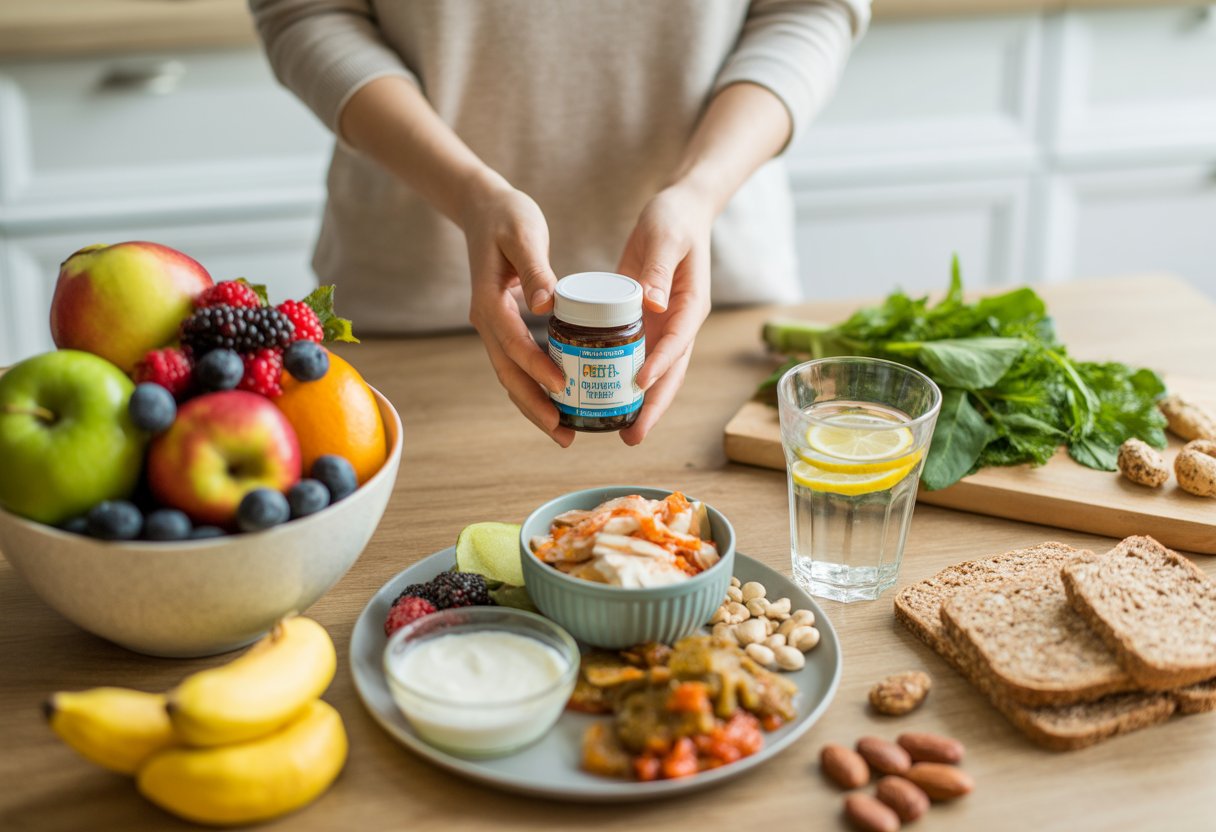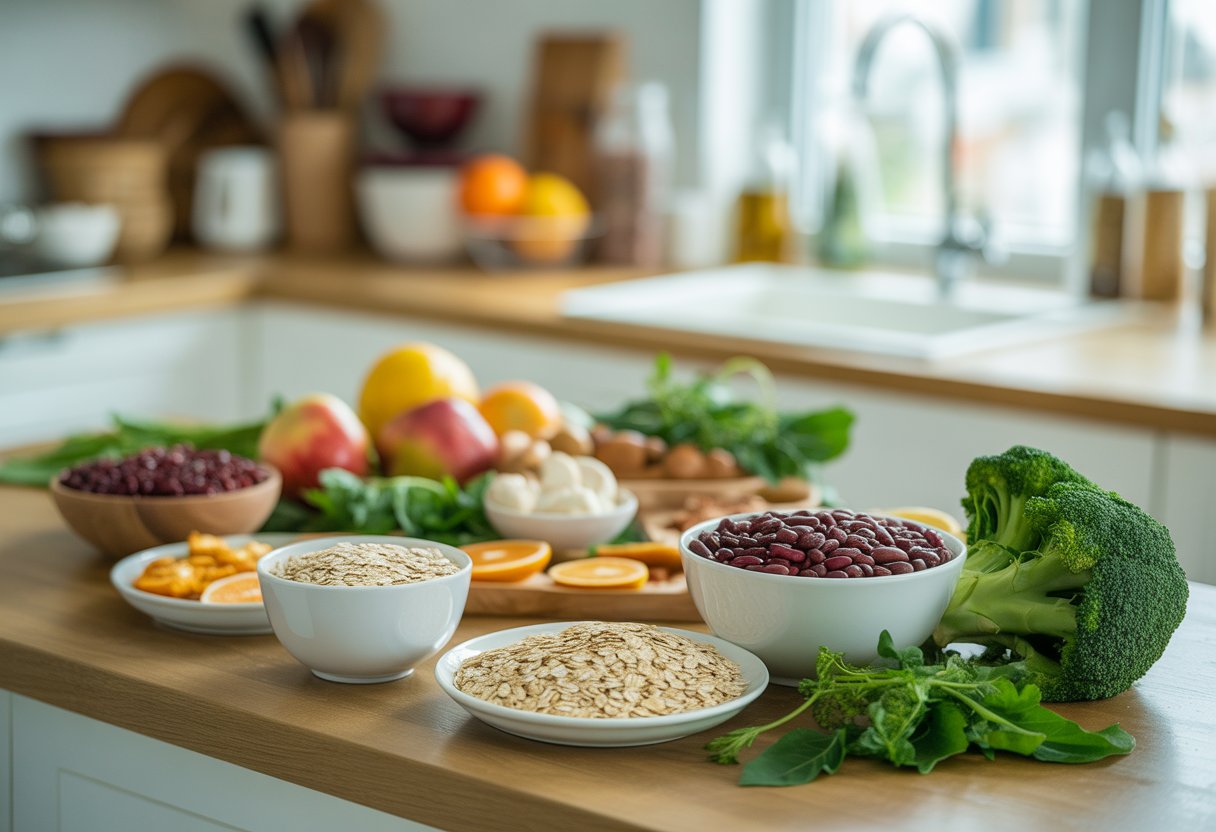Your gut health affects much more than just digestion. The trillions of bacteria living in your digestive system play a key role in your immune system, mood, sleep quality, and overall wellness.

Making simple daily changes to support your gut bacteria can lead to better digestion, stronger immunity, and improved energy levels. The path to a healthier gut involves eating foods rich in probiotics and prebiotics[1], managing stress, staying hydrated, and making smart lifestyle choices. These changes work together to create an environment where beneficial gut bacteria can thrive while harmful bacteria are kept in check.
1. Increase daily intake of fiber-rich foods like oats, beans, and broccoli

Fiber plays a key role in gut health by feeding beneficial bacteria in the digestive system. Most Americans don’t get enough fiber[2], which can harm their gut microbiome.
Oats contain soluble fiber that helps good bacteria grow. They also slow digestion and keep blood sugar stable. People can add oats to breakfast or smoothies easily.
Beans and lentils pack high amounts of fiber in small servings. Kidney beans and lentils top the list of foods high in fiber[3]. They provide both soluble and insoluble fiber types.
Broccoli offers fiber plus prebiotics that gut bacteria need to thrive. It also contains compounds that may protect the gut lining from damage.
Adding more fiber to the diet has many health benefits[4]. People should increase fiber slowly to avoid digestive upset. Drinking more water helps fiber work better in the body.
Simple swaps make fiber intake easier. Replace white rice with brown rice. Choose whole grain bread over white bread. Add beans to soups and salads.
2. Incorporate probiotic foods such as yogurt, kefir, and sauerkraut

Probiotics are live bacteria that help keep the gut healthy. These good bacteria support digestion and may improve overall health.
Yogurt is one of the most popular probiotic foods[5]. It contains live cultures that can help balance gut bacteria. People should look for yogurt with “live and active cultures” on the label.
Kefir is a fermented milk drink with more probiotic strains than yogurt. It has a tangy taste and can be drunk plain or added to smoothies.
Sauerkraut provides probiotics and is easy to add to meals[6]. This fermented cabbage works well as a side dish or topping. Raw sauerkraut contains more live bacteria than cooked versions.
Starting with one serving per day helps the body adjust[7]. A person might try yogurt with breakfast or sauerkraut with dinner. They can slowly add more probiotic foods over time.
These foods help restore balance when bad bacteria take over[8]. This is especially helpful after taking antibiotics or having digestive problems.
3. Eat prebiotic foods including garlic, onions, and bananas to nourish gut bacteria

Prebiotics are types of fiber that feed the good bacteria in your gut. These fibers help beneficial bacteria grow and stay healthy.
Garlic contains special fibers called inulin and fructooligosaccharides. These fibers nourish the good bacteria[9] already living in the digestive system.
Onions provide similar benefits to garlic. They contain prebiotics that help feed healthy gut bacteria and support digestion.
Bananas are great prebiotic food choices[10] that are easy to add to daily meals. They contain fiber that beneficial bacteria use as fuel.
Other prebiotic foods include asparagus, beans, and flaxseeds. Including 2-3 prebiotic foods daily[9] can help improve gut health.
People can add these foods to their diet in simple ways. They can cook with garlic and onions or eat bananas as snacks.
Prebiotics support immune function and help regulate blood sugar[10] along with improving gut health. The fiber feeds good bacteria so they can multiply and work better.
4. Stay well-hydrated by drinking at least 8 cups of water daily

Water plays a key role in keeping the digestive system working well. It helps break down food and move waste through the intestines.
The body needs enough fluid to produce digestive juices. These juices help the stomach and intestines process food properly.
Daily water intake recommendations[11] suggest about 15 cups for men and 11 cups for women from all fluids. This includes water from food and other drinks.
People can stay hydrated throughout the day[12] by drinking water at mealtimes and before, during, and after exercise. They should also drink when they feel thirsty.
Those who live in hot places or exercise often need more water. Sweating causes the body to lose extra fluid that must be replaced.
Drinking too much water is rarely a problem[13] for healthy adults. The kidneys can handle normal amounts of water intake.
Water helps soften stool and prevents constipation. When the body lacks water, waste moves more slowly through the colon.
5. Manage stress through mindfulness techniques like meditation or deep breathing

Chronic stress disrupts the gut-brain connection and can harm beneficial bacteria. The digestive system responds directly to stress hormones, which can increase inflammation and reduce gut health.
Mindfulness meditation helps interrupt the stress cycle[14] to allow space for better responses. Regular practice can lower stress levels and support overall well-being.
Deep breathing techniques are simple and effective ways to reduce stress[15]. Taking slow, deep breaths through the nose and exhaling gently through the mouth activates the body’s relaxation response.
People can practice these techniques anywhere without special equipment. Just a few minutes of regular practice can improve mental health and lower stress levels[16].
Mindfulness involves focusing on the present moment without judgment[17]. This awareness helps people manage daily stressors more effectively.
Other helpful techniques include guided imagery and progressive muscle relaxation. These practices help relax both body and mind, creating better conditions for gut health.
6. Get 7-9 hours of quality sleep every night to support gut repair

Sleep plays a crucial role in gut health. During rest, the digestive system enters restoration mode and begins important repair work.
The gut microbiome follows natural daily rhythms. Quality sleep allows the gut time to recover and regenerate[18] each night.
While people sleep, their bodies rebuild the gut lining. This process helps balance the bacteria in the digestive system and reduces inflammation.
Aiming for 7-9 hours of sleep each night helps the gut thrive[19] and supports overall health. Poor sleep can disrupt these repair processes.
People can improve their sleep quality by creating good bedtime habits. Reducing screen time before bed helps prepare the body for rest.
A dark, quiet, and cool bedroom creates the best sleep environment. Consistent bedtime routines signal the body that it’s time to sleep[20].
Getting enough sleep gives the gut the time it needs to do its best work[21]. This nightly repair process is essential for maintaining a healthy digestive system.
7. Engage in regular physical activity, such as brisk walking or yoga

Physical activity helps improve gut health by promoting better digestion and supporting healthy gut bacteria. Exercise increases blood flow to the digestive system and helps food move through the intestines.
Regular aerobic activity, such as walking[22], can benefit overall health including the gut. Brisk walking for 30 minutes most days of the week provides excellent digestive benefits.
A regular yoga practice can benefit physical and mental health[23] while supporting gut function. Yoga poses that involve twisting and gentle compression can help stimulate digestion.
Exercise helps reduce stress hormones that can negatively impact gut bacteria. When stress levels drop, the gut environment becomes more favorable for beneficial microbes to thrive.
Regular physical activities include walking, running, cycling, swimming, or dancing[24]. People can choose activities they enjoy to make exercise a sustainable habit.
Even light movement after meals can help. A five-minute walk after eating can help keep blood sugar levels stable[25], which supports gut health.
Physical activity also helps maintain healthy weight, which reduces inflammation that can harm gut bacteria.
8. Limit consumption of processed foods and added sugars

Processed foods high in sugar and additives can harm gut bacteria. These foods often lack the nutrients that support healthy digestion.
Ultra-processed foods are loaded with sugar and other additives[26] while missing important nutrients. They can disrupt the balance of good bacteria in the gut.
Added sugars feed harmful bacteria more than beneficial ones. This creates an imbalance that affects digestion and overall gut health.
People should focus on whole foods like fruits, vegetables, and lean proteins instead. These foods provide fiber and nutrients that good gut bacteria need to thrive.
Reading food labels helps identify hidden sugars and additives. Learning to distinguish between healthy and unhealthy processed options[27] allows for better food choices.
Cooking simple meals at home reduces reliance on packaged foods. Fresh ingredients give people more control over what they eat.
Making wise food choices doesn’t mean taking the joy out of eating[28]. Small changes in food selection can make a big difference for gut health over time.
9. Avoid unnecessary use of antibiotics to protect gut microbiome balance

Antibiotics can be life-saving medications when needed. However, they also damage the beneficial bacteria living in the digestive system.
Antibiotics can temporarily wipe out the gut microbiome[29] by destroying both harmful and helpful bacteria. This disruption can affect digestion and immune function.
Common antibiotics destroy important bacterial groups[30] in the gut. Some medications cause more damage than others to the microbiome balance.
People should only take antibiotics when doctors prescribe them for bacterial infections. Taking antibiotics for viral infections like colds or flu will not help and may harm gut health.
Balancing antibiotic use with gut protection[31] helps maintain long-term health. The key is using these medications only when necessary.
When antibiotics are required, people can take steps to support their gut during treatment. Eating diverse foods and avoiding processed items helps protect remaining beneficial bacteria.
Minimizing gut disruptors like alcohol and added sugars[32] prevents further damage during antibiotic treatment.
10. Include healthy fats like olive oil and avocado in your diet

Healthy fats play an important role in gut health. They help the body absorb fat-soluble vitamins and support the growth of beneficial gut bacteria.
Olive oil contains compounds that may reduce inflammation in the digestive tract. It also provides monounsaturated fats that the body needs for proper function.
Avocados are rich in monounsaturated fats[33] that can help improve cholesterol levels. They also contain fiber that feeds good bacteria in the gut.
People can make their own salad dressing with heart-healthy oils[34] like olive oil. They should mix two parts oil with one part vinegar or citrus juice.
Adding avocado to meals provides both healthy fats and fiber. People can slice it onto toast, blend it into smoothies, or add it to salads.
These healthy fats help the body absorb vitamins[35] A, D, E, and K. Without enough fat in the diet, the body cannot properly use these nutrients.
Both olive oil and avocados are easy to include in daily meals. They add flavor while supporting digestive health.
How Gut Health Influences Overall Wellness

The gut microbiome directly affects immune function, mental health, and disease prevention through complex bacterial interactions. An imbalanced gut creates inflammation and disrupts normal body processes.
Role of the Gut Microbiome
The gut microbiome contains trillions of bacteria that process food and help the body stay healthy[36]. These bacteria do much more than digest meals.
Immune System Support About 70% of the immune system lives in the gut. Beneficial bacteria train immune cells to recognize harmful invaders. They also create a protective barrier against dangerous microbes.
Brain Communication The gut produces 90% of the body’s serotonin, a chemical that affects mood and sleep. Gut bacteria send signals to the brain through the vagus nerve. This connection explains why gut health influences mood and mental well-being[37].
Nutrient Production Healthy gut bacteria make important vitamins like B12, folate, and vitamin K. They also help the body absorb minerals such as calcium and magnesium.
Signs of an Imbalanced Gut
An unhealthy gut creates noticeable symptoms throughout the body. These signs often appear before serious health problems develop.
Digestive Issues
- Bloating after meals
- Gas and stomach pain
- Diarrhea or constipation
- Acid reflux or heartburn
Physical Symptoms Skin problems like acne or eczema often reflect gut inflammation. Frequent colds and infections suggest weakened immunity. Joint pain and headaches may also occur.
Mental and Emotional Changes Poor gut health affects brain function. People may experience mood swings, anxiety, or depression. Sleep problems and brain fog are also common signs.
Food Reactions New food sensitivities or cravings for sugar and processed foods indicate bacterial imbalance. The body may struggle to process foods that were previously well-tolerated.
Common Gut Health Myths Explained

Many people believe probiotics work the same for everyone and that all fiber is equally beneficial. These common gut health myths[38] can lead to poor choices that hurt digestive health rather than help it.
Debunking Probiotic Misconceptions
Not all probiotics are the same. Each strain has different effects on the body. What works for one person may not work for another.
More CFUs doesn’t always mean better results. CFU stands for colony-forming units. A product with 50 billion CFUs isn’t automatically better than one with 10 billion CFUs.
Many people think probiotics survive stomach acid easily. Most probiotic bacteria die before reaching the intestines. Only certain strains can survive the journey.
| Common Myth | Reality |
|---|---|
| All probiotics are the same | Different strains have different benefits |
| Higher CFU count is better | Quality matters more than quantity |
| Probiotics always work | Individual responses vary greatly |
Timing matters when taking probiotics. Taking them with food can help protect the bacteria from stomach acid. Some work better on an empty stomach.
Doctors and dietitians see these misconceptions[39] in their practice daily. People often expect quick results from probiotics, but changes take weeks or months to notice.
Misunderstandings About Dietary Fiber
People often think all fiber works the same way in the body. There are two main types: soluble and insoluble fiber. Each type has different jobs.
Soluble fiber dissolves in water and forms a gel. It helps lower cholesterol and blood sugar. Foods like oats and apples contain soluble fiber.
Insoluble fiber doesn’t dissolve in water. It adds bulk to stool and helps food move through the digestive system. Whole grains and vegetables contain this type.
Some people believe fiber supplements replace the need for fiber-rich foods. Whole foods provide vitamins, minerals, and other compounds that supplements don’t have.
Adding too much fiber too quickly causes gas, bloating, and stomach pain. The body needs time to adjust to higher fiber amounts. Start with small increases over several weeks.
Many think juice and smoothies provide the same fiber as whole fruits. Blending breaks down fiber structure. Whole fruits provide more digestive benefits than processed versions.
Frequently Asked Questions

People often have questions about improving their gut health through diet and lifestyle changes. These answers address common concerns about natural methods, warning signs, food choices, and daily habits that support digestive wellness.
What are natural strategies for enhancing gut health?
Eating fiber-rich foods like oats, beans, and broccoli helps feed beneficial bacteria in the digestive system. These foods provide the nutrients that good bacteria need to thrive.
Adding probiotic foods such as yogurt, kefir, and sauerkraut introduces live beneficial bacteria directly into the gut. Daily probiotic and prebiotic foods can improve gut health naturally[1].
Prebiotic foods including garlic, onions, and bananas nourish existing gut bacteria. These foods act as fuel for the microorganisms already living in the digestive tract.
Drinking at least 8 cups of water daily supports proper digestion and helps maintain a healthy gut lining. Proper hydration also helps move waste through the digestive system.
Managing stress through meditation or deep breathing exercises reduces harmful effects on gut bacteria. Stress management along with proper nutrition can significantly improve digestive health[40].
What are the common signs indicating an unhealthy gut?
Bloating after meals often indicates an imbalance in gut bacteria or difficulty digesting certain foods. This symptom frequently appears when harmful bacteria outnumber beneficial ones.
Irregular bowel movements including constipation or diarrhea suggest digestive system problems. An imbalanced gut commonly causes symptoms like bloating, constipation, and diarrhea[40].
Stomach discomfort, gas, and acid reflux point to digestive issues that may require attention. These symptoms often worsen when the gut microbiome is out of balance.
Frequent illness can indicate poor gut health since about 70% of the immune system is located in the digestive tract. A healthy gut helps support immune function throughout the body.
Which foods should be avoided to maintain good gut health?
Highly processed foods with artificial additives can disrupt the balance of gut bacteria. These foods often lack the nutrients that beneficial bacteria need to survive.
Excessive sugar feeds harmful bacteria and yeast in the digestive system. Too much sugar can lead to an overgrowth of bad bacteria that crowds out beneficial microorganisms.
Foods high in saturated fats may reduce the diversity of gut bacteria. A less diverse microbiome is associated with various digestive and health problems.
Artificial sweeteners can negatively affect gut bacteria composition in some people. These substances may alter the types and amounts of bacteria living in the digestive tract.
Alcohol in large amounts can damage the gut lining and reduce beneficial bacteria populations. Regular heavy drinking creates inflammation that harms the digestive system.
What are effective methods to reset gut health?
Eating a diverse range of plant-based foods increases the variety of beneficial bacteria in the gut. Different types of fiber and nutrients support different bacterial species.
Taking a break from processed foods for several weeks allows the gut to heal and beneficial bacteria to recover. This approach gives the digestive system time to restore balance.
Getting adequate sleep helps maintain healthy gut bacteria since the microbiome follows daily rhythms. Poor sleep can disrupt these natural cycles and harm digestive health.
Regular exercise promotes the growth of beneficial bacteria and improves overall digestive function. Physical activity helps move food through the digestive system more efficiently.
How can one increase beneficial gut bacteria without supplements?
Fermented foods like kimchi, miso, and kombucha contain live beneficial bacteria that can colonize the gut. These foods provide natural probiotics without the need for pills or powders.
Foods that boost gut health work better than supplements for many people[41]. Whole foods provide additional nutrients that support bacterial growth.
Eating a variety of colorful fruits and vegetables provides different types of fiber that feed various bacterial species. Each color often represents different beneficial compounds.
Including resistant starches from cooled potatoes, rice, and green bananas feeds beneficial bacteria in the colon. These starches resist digestion in the small intestine and reach the large intestine intact.
What practices contribute to maintaining a healthy digestive system?
Eating meals at regular times helps establish healthy digestive rhythms and supports beneficial bacteria. Consistent meal timing trains the digestive system to work more efficiently.
Chewing food thoroughly breaks it down properly and makes it easier for beneficial bacteria to process. Good chewing also signals the digestive system to produce necessary enzymes.
Avoiding unnecessary antibiotics preserves beneficial bacteria that antibiotics can destroy along with harmful ones. Only using antibiotics when medically necessary protects the gut microbiome.
Regular exercise, quality sleep, and stress management create a foundation for good digestive health[42]. These lifestyle factors work together to support optimal gut function.
References
- eating foods rich in probiotics and prebiotics. https://www.eatingwell.com/article/8021156/foods-to-improve-gut-health-overnight/ Accessed October 20, 2025
- Most Americans don’t get enough fiber. https://www.eatingwell.com/small-changes-that-helped-me-eat-more-fiber-11775341 Accessed October 20, 2025
- 31 High-Fiber Foods You Should Eat. https://health.clevelandclinic.org/high-fiber-foods Accessed October 20, 2025
- Adding more fiber to the diet has many health benefits. https://www.health.com/how-to-eat-more-fiber-11716937 Accessed October 20, 2025
- Yogurt is one of the most popular probiotic foods. https://www.health.com/foods-high-in-probiotics-11822412 Accessed October 20, 2025
- 19 Foods High in Probiotics. https://health.clevelandclinic.org/probiotic-foods Accessed October 20, 2025
- Probiotic drinks: What really works for gut health, from kefir to probiotic sodas. https://mcpress.mayoclinic.org/healthygut/probiotic-drinks-what-really-works-for-gut-health-from-kefir-to-probiotic-sodas/ Accessed October 20, 2025
- 10 Best Ways to Combine Prebiotics and Probiotics for Gut Health: Enhance Digestion with Easy Meal Tips – The Prebiotic Pantry. https://www.theprobioticprebiotic.com/articles/best-combine-prebiotics-probiotics-gut-health Accessed October 20, 2025
- 20 Prebiotic Foods for Gut Health. https://www.cleaneatzkitchen.com/a/blog/20-prebiotic-foods-for-gut-health Accessed October 20, 2025
- Access to this page has been denied. https://www.goodrx.com/well-being/gut-health/best-prebiotic-foods Accessed October 20, 2025
- Daily water intake recommendations. https://www.verywellhealth.com/how-much-water-should-you-drink-per-day-11821239 Accessed October 20, 2025
- stay hydrated throughout the day. https://www.health.com/drinking-more-water-for-30-days-8731375 Accessed October 20, 2025
- Water: How much should you drink every day?. https://www.mayoclinic.org/healthy-lifestyle/nutrition-and-healthy-eating/in-depth/water/art-20044256 Accessed October 20, 2025
- How to Manage Stress with Mindfulness and Meditation. https://www.mindful.org/how-to-manage-stress-with-mindfulness-and-meditation/ Accessed October 20, 2025
- Top 10 Mindfulness Exercises for Stress Relief and Mental Clarity. https://quitemindful.com/mindfulness/mindfulness-exercises/ Accessed October 20, 2025
- 10 Best Meditation Techniques for Stress Relief & Relaxation. https://bioneurix.com/blogs/blog/10-best-meditation-techniques-for-stress Accessed October 20, 2025
- Mindfulness exercises. https://www.mayoclinic.org/healthy-lifestyle/consumer-health/in-depth/mindfulness-exercises/art-20046356 Accessed October 20, 2025
- Daily Gut Health Routine: Morning to Night Checklist – GutNow. https://www.gutnow.com/medical-treatments/daily-gut-health-routine-morning-to-night-checklist/ Accessed October 20, 2025
- The Surprising Role of Sleep in Gut Repair. https://www.factandmyth.com/health-weightloss/the-surprising-role-of-sleep-in-gut-repair Accessed October 20, 2025
- 10 Ways To Improve Your Gut Health According To A Dietitian. https://www.brainzmagazine.com/post/10-ways-to-improve-your-gut-health-according-to-a-dietitian Accessed October 20, 2025
- The Surprising Link Between Sleep and Gut Health. https://nikkihawkes.com/the-surprising-link-between-sleep-and-gut-health Accessed October 20, 2025
- Aerobic exercise: Top 10 reasons to get physical. https://www.mayoclinic.org/healthy-lifestyle/fitness/in-depth/aerobic-exercise/art-20045541 Accessed October 20, 2025
- A regular yoga practice can benefit physical and mental health. https://www.verywellhealth.com/daily-exercises-11679282 Accessed October 20, 2025
- 429 Too Many Requests. https://actionablewellness.com/10-simple-ways-to-get-active-and-fit/ Accessed October 20, 2025
- 10 Easy Microhabits to Help Your Brain Health Daily. https://www.aarp.org/health/healthy-living/microhabits-brain-health/ Accessed October 20, 2025
- Access to this page has been denied. https://www.goodrx.com/well-being/diet-nutrition/tips-for-avoiding-processed-foods Accessed October 20, 2025
- Error 403. https://en.mui.kitchen/food/Your-Body-Will-Thank-You-11-Tips-to-Cut-Down-on-Processed-Foods-in-Your-Diet-20250114-0010.html Accessed October 20, 2025
- Making wise food choices doesn’t mean taking the joy out of eating. https://thedacore.org/real-food-real-health-10-ways-to-cut-back-on-processed-foods/ Accessed October 20, 2025
- Antibiotics can temporarily wipe out the gut microbiome. https://www.uclahealth.org/news/article/antibiotics-can-temporarily-wipe-out-gut-microbiome Accessed October 20, 2025
- The varying effects of antibiotics on gut microbiota. https://pmc.ncbi.nlm.nih.gov/articles/PMC8368853/ Accessed October 20, 2025
- Antibiotics and Gut Microbiome Health: Balancing the Pros and Cons. https://guthealth.org/antibiotics-and-gut-microbiome-health-balancing-the-pros-and-cons/ Accessed October 20, 2025
- Tips to Protect Your Gut Health While Using Antibiotics. https://optimalbio.com/tips-to-protect-your-gut-health-while-using-antibiotics/ Accessed October 20, 2025
- 11 Best Healthy Fats for Your Body and Ones to Avoid. https://draxe.com/nutrition/healthy-fats/ Accessed October 20, 2025
- 10 tips for incorporating healthy fats into your diet. https://www.roswellpark.org/cancertalk/202401/10-tips-incorporating-healthy-fats-your-diet Accessed October 20, 2025
- healthy fats help the body absorb vitamins. https://www.health.com/food/healthy-fats Accessed October 20, 2025
- Why is gut health so important? And how to improve yours…. https://www.bbcgoodfood.com/health/gut-health-what-does-it-really-mean Accessed October 20, 2025
- The Connection Between Gut Health and Whole-Body Wellness. https://www.sciencenewstoday.org/the-connection-between-gut-health-and-whole-body-wellness Accessed October 20, 2025
- 10 Gut Health Myths Debunked by Science (What Research Really Says). https://cleansethebowels.com/gut-health-myths-debunked/ Accessed October 20, 2025
- 7 Gut Health Myths GI Docs and Dietitians Really Wish You’d Stop Believing. https://www.self.com/story/gut-health-myths Accessed October 20, 2025
- Stress management along with proper nutrition can significantly improve digestive health. https://www.verywellhealth.com/how-to-improve-gut-health-11712148 Accessed October 20, 2025
- Foods Better for Your Gut Than Supplements, Per a Dietitian. https://www.today.com/health/diet-fitness/foods-better-gut-health-supplements-rcna230639 Accessed October 20, 2025
- How to Improve Gut Health Naturally. https://draxe.com/health/how-to-improve-gut-health-naturally/ Accessed October 20, 2025